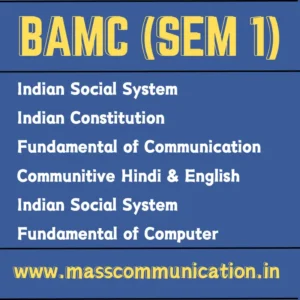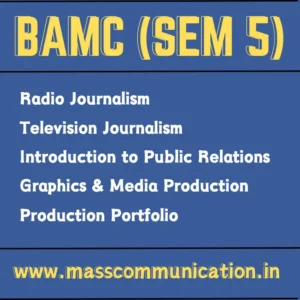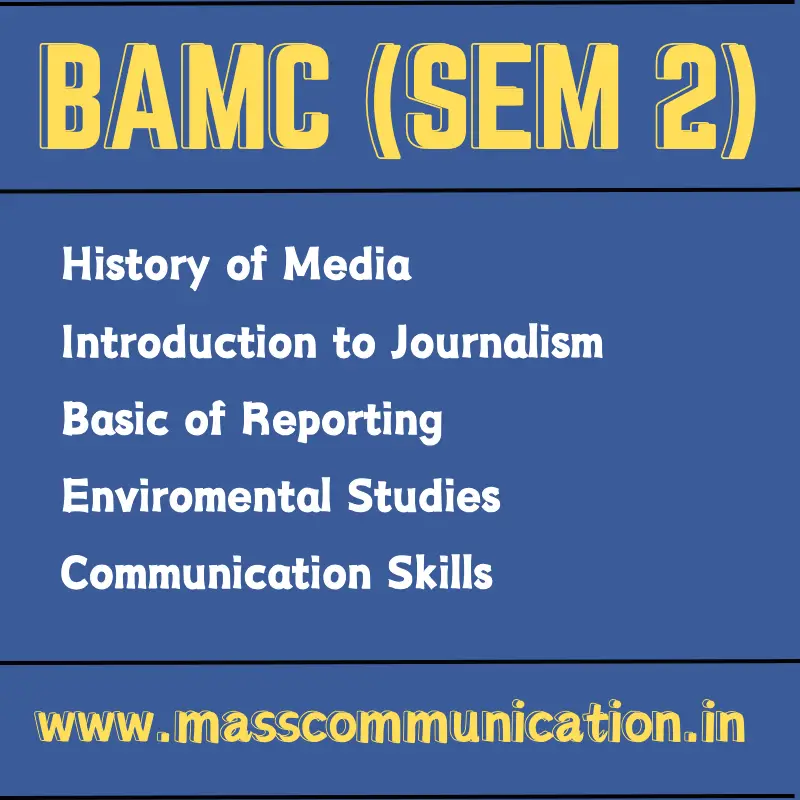Sale!
BAMC SEM 2 Notes – Mass Communication
₹499.00 Original price was: ₹499.00.₹199.00Current price is: ₹199.00.
Buy BAMC (B.A Mass Communication) Semester 2 Handwritten Notes PDF Online
- History of Media
- Introduction to Journalism
- Basic of Reporting
- Environment Studies
- Communication Skill
Category: BAMC
Tag: BAMC SEM 2 Notes
Description
BAMC SEM 2 Notes – Mass Communication: Buy BAMC (B.A Mass Communication) Semester 1 Handwritten Notes PDF Online
Buy BAMC (B.A Mass Communication) Semester 2 Handwritten Notes PDF Online
- History of Media
- Introduction to Journalism
- Basic of Reporting
- Environment Studies
- Communication Skill
Topic Cover (BAMC SEM 2 Notes)
History of Media
- Origin and development of the Press in India.
- Role of the press in the freedom movement
- Contribution of Raja Ram Mohan Roy, Mahatma Gandhi and Balgangadhar Tilak to Indian Press
- Post-independence Journalism
- Important phases of development of Radio in India
- All India Radio & Green Revolution
- Public & Commercial service
- Community Radio: Growth and Development
- Evolution of Television in India
- Various committee for development of Television in India
- Growth of Doordarshan and Private Channels
- Public Service & Compnercial TV broadcasting
- Brief History of ‘Silent Era’ to “Talkies”
- Golden era of Indian cinema
- Introduction to various Film Genres
Introduction to Journalism
- Journalism: Definition, concept, nature, scope & function
- Press as a ‘Fourth Estate”: meaning & role
- Journalism in India: History and development
- Journalism and Society
- Types & Elements of Journalis
- Alternative & Citizen Journalism
- Characteristics of a journalist
- Journalism skills
- Principle of journalism: Concept of 5W’s and I H
- Journalist as a Gatekeepers
- Journalist and their sources
- Journalist: Role & Responsibilities
- New trends in journalism
- Development journalism
- Journalism ethics
- Glossary of journalism
Basic of Reporting
- Introduction to Reporting: Concept & definition
- Principle of reporting
- Functions of reporting and reporting techniques
- Sources of News gathering, Verification and Validation (online, offline)
- Role, qualities and responsibilities of a reporter
- Duties of Reporter, Stringer, Correspondent, Bureaus
- Press conference, Press briefing and Meet the Press
- Human interest stories v/s hard stories
- Types of Reporting
- Reporting hierarchy in news organizations
- Covering various beats: Sports, Politics, Education, Crime, Business, Defence& Court
- Reporting Function, Meeting, Seminars, Workshops & Conferences
- Legislative Reporting (Parliament, Assembly and Local Bodies)
- Understanding of political trends and political Parties
- Reporting for rural area
- Basics of Investigative reporting
Environment Studies
- The Multidisciplinary nature of environmental studies and Natural resources. Definition; Scope and importance, Neod for public awareness. Natural resources and associated problems. Forest Resources: Use and Over-exploitation, deforestation, case studies. Timber extraction, mining. dams and their effects on forests and tribal people.
- Water Resources: Use and over-utilization of surface and ground water, floods, drought, conflicts over water, dams benefits and problems. Mineral resources: Use and exploitation, environmental effects of extracting and using mineral resources, case studies
- Food resources: World food problems, changes caused by agriculture and overgrazing, effects of modern agriculture, fertilizer-pesticide problems, water logging, salinity, case studies. Energy resources: Growing energy needs, renewable and non-renewable energy sources, use of alternate energy sources, Case studies
- Land resources: Land as a resource, land degradation, man induced landslides, soil erosion and desertification. Role of an individual in conservation of natural resources. Equitable use of resources for sustainable lifestyles.
- Ecosystems, Biodiversity and its Conservation Concept, structure and function of an ecosystem, producers, consumers and decomposers, energy flow in the ecosystem, chains, food webs and ecological pyramido ecological succession, food
- Introduction, types, characteristic features, structure and function of the following ecosystem: Forest ecosystem, Grassland ecosystem, Desert ecosystem, Aquatic ecosystems (ponds, streams, lakes, rivers, oceans, estuaries). Biodiversity introduction-Definition: genetic, species and ecosystem diversity
- Bio-geographical classification of India. Value of biodiversity: consumptive use, productive use, social, ethical, aesthetic and option values, biodiversity at global, national and local levels, India as a mega-diversity nation, Hot-spots of biodiversity.
- Threats to biodiversity: habitat loss, poaching of wildlife, man-wildlife conflicts, endangered and endemic species of India. Conservation of biodiversity: In-situ and Ex-situ conservation of biodiversity
- Environmental Pollution: Definitions, Causes, effects and control measures of: (a) Air pollution (b) Water pollution (c) Soil pollution (c) Noise pollution (d) Thermal pollution (e) Nuclear hazards (f) Marine pollution
- Solid waste Management: Causes, effects and control measures of urban and industrial wastes
- Role of an individual in prevention of pollution
- Pollution case studies
- Disaster management: floods, earthquake, cyclone and landslides.
- Social Issues and the Environment: From Unsustainable to Sustainable development. Urban problems related to energy. Water conservation, rain water harvesting, watershed management
- Resettlement and rehabilitation of people; its problems and concerns. Case studies. Environmental ethics: Issues and possible solutions.
- Climate change, global warming, acid rain, ozone layer depletion, nuclear accidents and holocaust. Case studies. Wasteland reclamation, Consumerism and waste products
- Environment Protection Act-Air (Prevention and Control of Pollution) Act, Water (Prevention and Control of Pollution) Act, Wildlife Protection Act.- Forest Conservation Act
- Issues involved in enforcement of environmental legislation, Public awareriess.
- Population growth, variation among nations
- Population explosion-Family welfare Programme
- Environment and human health, Human Rights, Value Education
- HIV/AIDS, Women and Child Welfare
- Role of information Technology in Environment and human health, Case Studies
Communication Skill
- Need for Effective communication, Language & Communication
- General Communication and Professional Communication
- Improving Writing skills
- Essentials of good Writing styles expressions & words to be avoided
- Developing Effective Listening Skills
- Types of listening
- Barriers to effective listening and their Remedies
- Techniques for Effective Listening
- Presentation Technique: Audio and Video.
- Public Speaking skills
- Reading skills: purpose, audience, locale, Steps in making presentation
- Conversation and Role play
- Writing skills: Emails, Blog Writing.
- Business Letters: Memo, Minutes, Notice
- Job application & CV preparation
- Report Writing
| Contact Us | Click Here |
| Shop Page | Click Here |
| Click Here | |
| Click Here |
Only logged in customers who have purchased this product may leave a review.
Related products
-
Sale!

BAMC SEM 4 Notes – Mass Communication
₹499.00Original price was: ₹499.00.₹199.00Current price is: ₹199.00. Buy Now -
Sale!

BAMC SEM 1 Notes – Mass Communication
₹499.00Original price was: ₹499.00.₹199.00Current price is: ₹199.00. Buy Now -
Sale!

BAMC SEM 5 Notes – Mass Communication
₹499.00Original price was: ₹499.00.₹199.00Current price is: ₹199.00. Buy Now


Reviews
There are no reviews yet.